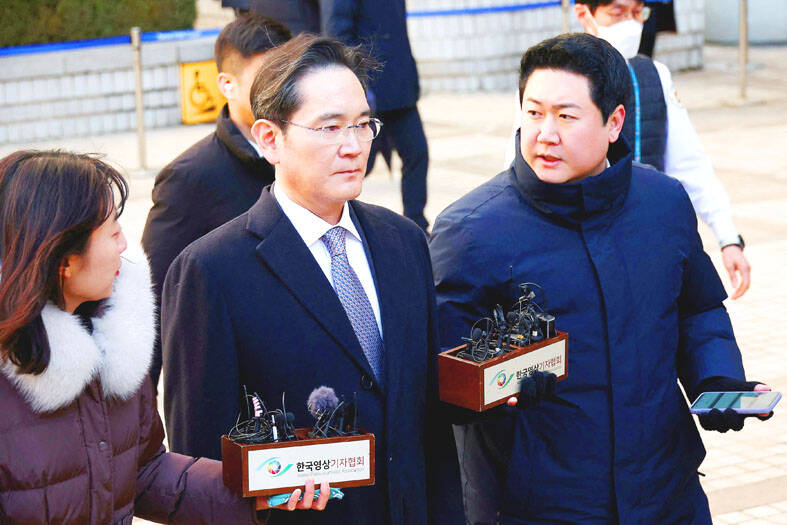South Korea’s top court yesterday cleared Samsung Electronics chairman Jay Y. Lee of accounting fraud and stock manipulation, permanently removing a long-running legal risk for the head of the country’s biggest company.
The Supreme Court upheld an appeals court’s ruling dismissing all charges in the case involving a US$8 billion merger in 2015, freeing Lee to focus on Samsung’s push to catch up in a global race to develop cutting-edge artificial intelligence chips.
A lower court last year had also cleared Lee of the charges relating to a deal between two Samsung affiliates, Samsung C&T and Cheil Industries, which prosecutors said was designed to cement Lee’s control of the tech giant.

Photo: Reuters
“The Supreme Court ruling clears a layer of legal uncertainty, which could be a long-term positive for Samsung,” said Ryu Young-ho, a senior analyst at NH Investment & Securities.
“It remains to be seen how directly and proactively he will engage going forward, but if the owner takes a more active role, it could allow management to focus more on long-term initiatives rather than short-term results,” Ryu added.
Samsung Electronics shares closed up 3.1 percent, outperforming a near-flat benchmark KOSPI.
Analysts attributed the rise to the removal of legal uncertainty surrounding Samsung, as well as investors switching to the company after Goldman Sachs downgraded local rival SK Hynix, sending its shares down as much as 9.5 percent.
The Supreme Court verdict was widely expected, but comes at a critical moment for Lee, who has faced mounting questions about his ability to lead Samsung Electronics — the world’s top memorychip and No. 2 smartphone maker.
For nearly a decade, Lee has faced legal challenges, including those from the merger that paved the way for his succession after his father, Lee Kun-hee, had a heart attack in 2014 that left him in a coma.
Jay Y. Lee, 57, spent 18 months in jail for bribery in a separate case related to former South Korean president Park Geun-hye, but was pardoned by then-South Korean president Yoon Suk-yeol.

CROSS-STRAIT COLLABORATION: The new KMT chairwoman expressed interest in meeting the Chinese president from the start, but she’ll have to pay to get in Beijing allegedly agreed to let Chinese Nationalist Party (KMT) Chairwoman Cheng Li-wun (鄭麗文) meet with Chinese President Xi Jinping (習近平) around the Lunar New Year holiday next year on three conditions, including that the KMT block Taiwan’s arms purchases, a source said yesterday. Cheng has expressed interest in meeting Xi since she won the KMT’s chairmanship election in October. A source, speaking on condition of anonymity, said a consensus on a meeting was allegedly reached after two KMT vice chairmen visited China’s Taiwan Affairs Office Director Song Tao (宋濤) in China last month. Beijing allegedly gave the KMT three conditions it had to

STAYING ALERT: China this week deployed its largest maritime show of force to date in the region, prompting concern in Taipei and Tokyo, which Beijing has brushed off Deterring conflict over Taiwan is a priority, the White House said in its National Security Strategy published yesterday, which also called on Japan and South Korea to increase their defense spending to help protect the first island chain. Taiwan is strategically positioned between Northeast and Southeast Asia, and provides direct access to the second island chain, with one-third of global shipping passing through the South China Sea, the report said. Given the implications for the US economy, along with Taiwan’s dominance in semiconductors, “deterring a conflict over Taiwan, ideally by preserving military overmatch, is a priority,” it said. However, the strategy also reiterated

‘BALANCE OF POWER’: Hegseth said that the US did not want to ‘strangle’ China, but to ensure that none of Washington’s allies would be vulnerable to military aggression Washington has no intention of changing the “status quo” in the Taiwan Strait, US Secretary of Defense Pete Hegseth said on Saturday, adding that one of the US military’s main priorities is to deter China “through strength, not through confrontation.” Speaking at the annual Reagan National Defense Forum in Simi Valley, California, Hegseth outlined the US Department of Defense’s priorities under US President Donald Trump. “First, defending the US homeland and our hemisphere. Second, deterring China through strength, not confrontation. Third, increased burden sharing for us, allies and partners. And fourth, supercharging the US defense industrial base,” he said. US-China relations under

The Chien Feng IV (勁蜂, Mighty Hornet) loitering munition is on track to enter flight tests next month in connection with potential adoption by Taiwanese and US armed forces, a government source said yesterday. The kamikaze drone, which boasts a range of 1,000km, debuted at the Taipei Aerospace and Defense Technology Exhibition in September, the official said on condition of anonymity. The Chungshan Institute of Science and Technology and US-based Kratos Defense jointly developed the platform by leveraging the engine and airframe of the latter’s MQM-178 Firejet target drone, they said. The uncrewed aerial vehicle is designed to utilize an artificial intelligence computer